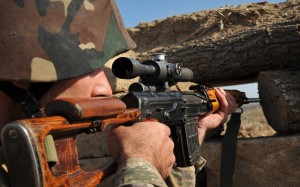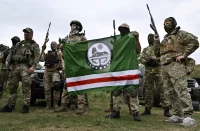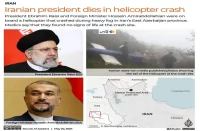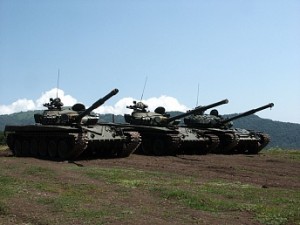Forecasted Conflict Scenario
Now that the actors, their ambitions, and motivating interests have been touched upon, one can move on to forecasting their expected behavior in a Nagorno-Karabakh continuation war. It is predicted that such a conflict will likely have five stages of logical progression, but given the uncertainties of warfare, anything can of course happen. The following should thus be seen as a strategic outline for how the conflict could possibly play out.
Stage One: Outbreak
Armenia and Azerbaijan will likely first come to blows along the Line of Contact established after the 1994 ceasefire. Armenia and its Russian protector have absolutely nothing to gain by aggravating the situation and inciting a war. Nagorno-Karabakh is already de-facto independent, and it is not in Yerevan or Moscow’s interests to instigate a bloody and unpredictable war to change this and the existing balance of power in the Southern Caucasus. In fact, it’s not even in Azerbaijan’s interests to do so either. Its elite live a lavish and wealthy lifestyle, and the opulent funds procured from stable natural resource shipments to Europe and Israel are more than enough to placate any nationalist and power revisionist longings among them (Credit for this observation goes to Dmitry Babich, who personally expressed this opinion to the author).
The perspective is different among the general population in Azerbaijan, however. They have been whipped up by their government over Nagorno-Karabakh for two decades now, and the loss of this territory and the massive amount of internally displaced people in the country as a result of it (700,000 people or 7.6% of the population) has become an integral part of their post-Soviet identity. Therefore, should the decision be made to militarily retake Nagorno-Karabakh (as Aliyev has threatened before), the population will support it. The only thing that could make Azerbaijan go against its elites’ previously described interests and shake the existing order is if the US either contracted the country to do so (per the Lead From Behind calculation of strategic destabilization) and/or promised some type of titillating reward for it (e.g. perhaps a post-war land corridor to Nakhchivan or even support for reunification with Iran’s ‘Southern Azerbaijan’).
 The US has a steady track record of misleading its ‘allies’ into engaging in disastrous military adventures, always under the inference that they would be quickly resolved and to their proxies’ benefit. In 2008, Saakashvili was under the impression that he could regain control over South Ossetia and Abkhazia, but Russia decisively proved him wrong. The war was short, as the US inferred it would be, but not in the way that Tbilisi or Washington wanted. In 2011, Turkey was talked into being the staging ground for the Syrian destabilization in exchange for re-establishing its Ottoman hegemonic legacy. This resulted in a disastrous campaign that killed over 100,000 people (with American, European, Turkish, Israeli, and Gulf Arab complicity) and is still ongoing three years after it began. The coup government in Kiev was also promised a speedy war in Donbass that would solidify its regime all across the country. Suffice to say, things are not panning out for the authorities as was anticipated and the entire country is now collapsing. Quite obviously, none of the US’ ‘allies’ have gained anything positive from these experiences, and if America continues its pattern (and it shows no sign of abating), then Azerbaijan will likely fall into the same detrimental trap as those who came before it.
The US has a steady track record of misleading its ‘allies’ into engaging in disastrous military adventures, always under the inference that they would be quickly resolved and to their proxies’ benefit. In 2008, Saakashvili was under the impression that he could regain control over South Ossetia and Abkhazia, but Russia decisively proved him wrong. The war was short, as the US inferred it would be, but not in the way that Tbilisi or Washington wanted. In 2011, Turkey was talked into being the staging ground for the Syrian destabilization in exchange for re-establishing its Ottoman hegemonic legacy. This resulted in a disastrous campaign that killed over 100,000 people (with American, European, Turkish, Israeli, and Gulf Arab complicity) and is still ongoing three years after it began. The coup government in Kiev was also promised a speedy war in Donbass that would solidify its regime all across the country. Suffice to say, things are not panning out for the authorities as was anticipated and the entire country is now collapsing. Quite obviously, none of the US’ ‘allies’ have gained anything positive from these experiences, and if America continues its pattern (and it shows no sign of abating), then Azerbaijan will likely fall into the same detrimental trap as those who came before it.
Stage Two: International Response
Russia, the most important actor besides the two warring parties, is bound to protect Armenia from any aggression, but the nuance is that Moscow does not recognize Nagorno-Karabakh as under Yerevan’s jurisdiction. Azeri aggression against Armenian and Karabakh forces in that region will likely not meet with any militarized Russian reaction. Of course, Russia may place its forces in the Northern Caucasus and Armenia on high alert, but it will not directly engage Azerbaijan. Crisis diplomacy and calls for an immediate cessation of violence will likely be heard from Moscow at this stage while it prepares for the contingency that Azerbaijan’s offensive may spread into Armenia proper.
The US will be Leading From Behind by supporting Azerbaijan diplomatically and with battlefield intelligence. It may eventually subcontract additionally military involvement to Turkey, but this stage will be addressed later on. More than likely, Azerbaijan will begin the American-advised war either on the false pretext of an Armenian ‘provocation’ or simply on the fact that it wants to restore its territorial integrity. It seems more plausible that it will begin by using the former as a justification for advancing the latter. This is because Armenia is closely allied to Russia, and in the West, everything is made to be ‘Putin’s fault’. By making it seem as though Azerbaijan is responding to Russian-sponsored aggression against territorial integrity (much in the same vein as the West has marketed Kiev’s offensive against the pro-Federalists), the US and EU will diplomatically support it. The EU will also press for a quick resolution to the conflict in order to secure its energy interests.
Israel will voice its support for Azerbaijan, too, seeing its close ally’s offensive against Nagorno-Karabakh and response to ‘aggression’ as mirroring its own offensives in Gaza and the West Bank under the same pretenses. Like the EU, Israel is worried that its energy trade with Azerbaijan may be disrupted by a prolonged conflict, so it will also want to see a quick Azeri victory. Turkey will automatically support Azerbaijan because of its “one nation, two states” concept and historical antagonism against the Armenians, but it will stop short of a military attack until the Nakhchivan pretext is played (to be discussed later). Since it is on the downstream end of Azerbaijan’s energy projects (which increase Turkey’s international significance and influence), it, too, will want Baku to defeat Armenia as quickly as possible. Georgia and Iran and will be more reserved, however, preferring to see a quick halt in violence regardless of outcome.
 Tbilisi does not want to be faced with the prospect of Moscow requesting transit rights for its military in reinforcing its Armenian base. These rights were de-facto abolished after the 2008 war and de-jure in 2011, after which Russia allegedly struck a deal with Azerbaijan to continue its logistical operations. Baku would obviously not allow this to continue under a conflict environment, and thus, Moscow would have to route its supplies and troops over Georgian land or airspace once more. The reason Russia would not force them through Azerbaijan is that it will only militarily engage the country if Armenia proper is attacked, and even then, in an operation to ‘force Azerbaijan to peace’ (to paraphrase the justification of the 2008 war), it is not likely Russia will directly place its units into areas outside of the conflict zone (although it may strike them with long-range munitions or bombs). Therefore, Russian military transit through Georgia is the only option available, and this concern overrides any cares that Tbilisi has about Azerbaijan’s pipelines crossing its territory and their possibly disruption.
Tbilisi does not want to be faced with the prospect of Moscow requesting transit rights for its military in reinforcing its Armenian base. These rights were de-facto abolished after the 2008 war and de-jure in 2011, after which Russia allegedly struck a deal with Azerbaijan to continue its logistical operations. Baku would obviously not allow this to continue under a conflict environment, and thus, Moscow would have to route its supplies and troops over Georgian land or airspace once more. The reason Russia would not force them through Azerbaijan is that it will only militarily engage the country if Armenia proper is attacked, and even then, in an operation to ‘force Azerbaijan to peace’ (to paraphrase the justification of the 2008 war), it is not likely Russia will directly place its units into areas outside of the conflict zone (although it may strike them with long-range munitions or bombs). Therefore, Russian military transit through Georgia is the only option available, and this concern overrides any cares that Tbilisi has about Azerbaijan’s pipelines crossing its territory and their possibly disruption.
Iran has a different justification for remaining on the sidelines: it does not want Azerbaijan or Israel to exploit the existing conflict to distract it or place it in a vulnerable position. Additionally, it does not want to fight someone else’s (Armenia and possibly Russia’s) war. The large Azeri minority in the northern border region can always be manipulated to destabilize Iran, and this is something that decision makers are attentively aware of.
Stage Three: Regional Tremors
Georgia and Iran are prime for near-immediate destabilization after the onset of a continuation war. To begin with, Georgia’s Samtskhe-Javakheti region is majority inhabited by Armenians. It could plausibly arise where the West launches an information blitzkrieg about this issue in order to rhetorically make Tbilisi question whether or not this population, like the Armenians in Nagorno-Karabakh, will want to forcibly reunify with their Armenian brethren with help of the ‘Russian menace’. This will also resurrect the shadow of the negative information campaign surrounding Crimea’s reunification with Russia. What’s more, the 2008 war is still fresh in the minds of many Georgians, further increasing their sensitivity to Western anti-Russian propaganda. All of this may compel them to treat Armenians there as second-class citizens, much as Russians in the Baltic are treated and the individuals in Kiev’s ‘liberated territories’ could soon be. It goes without saying that this can lead to chain reaction of internal destabilization.
Iran is also vulnerable to destabilization, and this stems from the aforementioned Azeri factor in its northern regions. If the population there (either on its own, or more likely, through outside influence) begins aggressive public demonstrations to show their support for Baku, this could rapidly spiral into nationalist demonstrations that explode into outright independence agitation and a Color Revolution-esque attempt at achieving it on the regional level. If that fails, Syrian-style unconventional warfare is always an option. Both scenarios would destabilize Iran much to the West and Israel’s delight, taking advantage of the regional chaos to churn a Black Hole out of very little investment on their part. In these actors’ understanding, supporting such activity is a win-win for them.
Stage Four: The Escalation
There are three major events that are guaranteed to escalate an Armenian-Azeri continuation war into a direct regional ruckus. They are all extremely significant, and in no particular order they are:
Azerbaijan Attacking Armenia Proper:
If Azerbaijan directly attacks Armenia, this would instantly result in Armenia activating its mutual defense treaty with Russia and calling in Moscow’s military might to defend it. This could happen if Azerbaijan is on the offensive on Nagorno-Karabakh and decides to take the war into Armenia to finish its military off ‘once and for all’, or if it engages in a provocation from Nakhchivan as a rear or flank attack to relieve pressure from the Karabakh front or bring Turkey into the war.
Georgia Blockading Armenia:
Blockades are acts of war, and if Georgia de-facto blockades Armenia during a continuation war in Karabakh, this would certainly result in a Russian intervention. The reasoning is two-fold. First, Armenia would be placed in an even more dire economic position than it is now if war with Azerbaijan breaks out, making it all the more dependent on Georgia for the transit of goods. Iran does not have the required infrastructure and logistical networks to immediately compensate for any loss in Georgian-transited trade, and Russia will not allow Yerevan to suffer a war of attrition similar to what happened to Leningrad during World War II.
Additionally, it was earlier mentioned that Russian forces may request immediate transit rights through Georgia to resupply their base in Armenia, but it is uncertain how Tbilisi would respond. Although it is in their best and most peaceful interests to accede to this, they may look at it as a ‘shadow intervention’ or ‘occupation’, and the US and NATO may once more falsely assure Georgia that they would militarily support its anti-Russian political decisions. Even more likely, they would actively make sure that Georgia does not agree to Russia’s request and would pressure it behind the scenes. If Russia sees the need to reinforce its Armenian base, especially if Armenia itself is under Azeri attack, then it would transit its forces through Georgian territory with or without permission, with all of the resultant consequences thereof.
This event would be momentous since it would open the door for official NATO intervention in the conflict and its direct confrontation with Russia. Turkey would most likely use the pretext of a Nakhchivan provocation in order to enter the war. To remind the reader, Turkey is responsible for ensuring Nakhchivan’s territorial integrity per the 1921 Treaty of Kars and publicly reaffirmed this commitment in 2010. Azerbaijan may either create a provocation with Armenia through Nakhchivan to goad it into militarily responding or would simply directly attack it from this location. If the provocation scenario plays out, then Turkey would rush to Azerbaijan’s side in order to fulfill its legal obligation in defending against Armenian ‘aggression’. Such cunning of this caliber has been conspired by Turkey before, most recently in the Suleiman Shah Tomb false-flag plan. It is therefore not beyond Ankara to stage a similar setup with Azerbaijan in Nakhchivan to provoke a (NATO) war with Armenia.
Stage Five: The Caucasian Conflagration
This is the final step of the continuation war. By this stage, at least one of the previously mentioned escalations has occurred and the Karabakh conflict has become a larger war. At the worst, it could see Russia storming through a recalcitrant Georgia to resupply its Armenian base, Azerbaijan bringing the war into Armenia proper, and Turkey moving to capture Yerevan in a swift offensive while being blocked by Russia’s nearby units. As this is occurring, Iran could find itself in the same quagmire in its north that Kiev is currently experiencing in its east, albeit for completely different reasons and purposes. All the while, the US/NATO and Russia would face off in the closest they have ever come to conventional or nuclear war as a result of the Russia-Armenia and Turkey-NATO treaty interplay, with the future of the world hanging in the balance.
Conclusion
A continuation war in Nagorno-Karabakh cannot be removed from the US’ grand strategic designs for Eurasia. Azerbaijan by its own will would not risk jeopardizing its wealth, status, and prestige through a risky and likely extended conflict, especially considering the possibility of Russian military intervention on behalf of Armenia. It would only partake on this dangerous course if set up to do so by the US, either through devious misleads or direct commands. The US seeks to maintain as many painful hot spots in areas sensitive to Russia’s security as possible (this of course includes Ukraine), thereby fulfilling the overarching goal of peripheral destabilization in order to weaken the Russian center. The US’ weaponization of chaos may be an effective strategy in the short term and in certain theaters, but its Pandora Box-nature makes it even more devilishly dangerous in the political context of the Caucasus. Due to the fact that it is chaos, the domino destabilization that it brings with it can become absolutely uncontrollable and result in extremely negative and undesirable results, with the US/NATO and Russian faceoff representing the most ominous outcome for the entire world.















great article.insightful as usual,but that raises a concerning possibility,what is exactly that’s preventing the WASP empire of setting off a whole series of local flashpoints simultaneously across Russia’s periphery?how Russia’s leadership would cope with such a challenge?
As an Armenian and from my perspective both article parts are excellent and a good place to start for those that don’t know much about the region.
Armenia is in a very difficult position, and seeing how the US has operated in Libya, Egypt, Iraq, Syria, the Balkans, and Ukraine, I fear that the US will eventually decide to raise the stakes in the region. The US could care less about the suffering it will cause, as it thinks it controls the media and can therefore control the narrative.
The US has shown itself to be tragedy and farce. It truly is the Empire of Chaos.
Pingback: Nagorno-Karabakh and the Domino Destabilization of Disaster (I) – OrientalReview.org